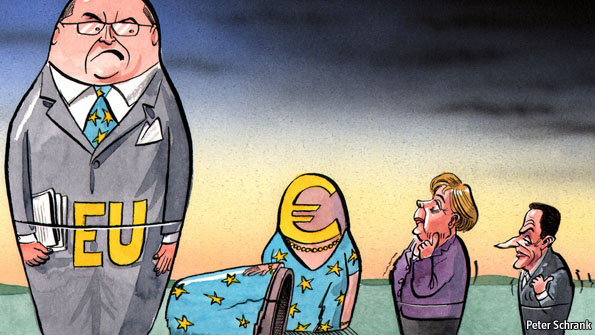
From Charlemagne, the Economist: When Germany and France disagree, everybody complains about paralysis in Europe. When they agree, the protest is about unacceptable diktats. So when Angela Merkel and Nicolas Sarkozy pushed an EU summit in Brussels to approve their “competitiveness pact”, which calls for closer co-ordination of economic policies among countries using the euro, an outcry was only to be expected. Yet its vehemence took them aback.
Over a long and bad-tempered lunch, almost every other EU leader railed against something. Ireland rejected the idea of aligning EU corporate taxes (or at least the tax base) as a danger to its low-tax growth model. Belgium and Luxembourg resisted calls to abolish their system of index-linked wages. The Baltics said they should not raise their pension age as fast as west Europeans because their people tend to die younger. Poland denounced plans for separate summits of euro-zone leaders for being divisive. From Stettin to Trieste, many easterners feel, a curtain is descending again. This time it bears the symbol of the euro. …
Whatever the details, one thing is clear: the EU is at a turning-point. The debt crisis is forcing the 17 euro-zone countries to pool economic sovereignty to a degree that was unthinkable before. And their relationship with the ten non-euro outsiders, ranging from eurosceptical Britain to east Europeans who are keen to join the single currency, has been thrown into doubt. …
Mrs Merkel will not allow the euro to collapse. But neither can she ask German voters to hand their credit cards to less disciplined countries. Her price for boosting the bail-out fund is thus a grand bargain, with the competitiveness pact at its heart. She wants members of the euro zone to abide by the example of the “best-performing countries” (ie, Germany), for example by adopting a constitutional or other domestic legal “debt brake”. Germany will make itself heard—at a time of crisis, the euro zone needs its biggest creditor. But to be followed, Germany still needs the support of France. Mrs Merkel has yielded to Mr Sarkozy on matters of form, even if the substance is mostly German.
For domestic reasons, both leaders want to show they can lead Europe, and even to dictate terms. Mrs Merkel must demonstrate she can impose rigour on profligate Mediterraneans. Mr Sarkozy hopes that standing with Mrs Merkel at the helm of Europe will allow him to remain in charge of France after the 2012 presidential election. And reforms to push back the danger of France losing its AAA credit rating will be easier if they are part of a great European project. (graphic: Peter Schrank/Economist)
Image: economist%202%2010%2011%20EU%20France%20Germany.jpg

